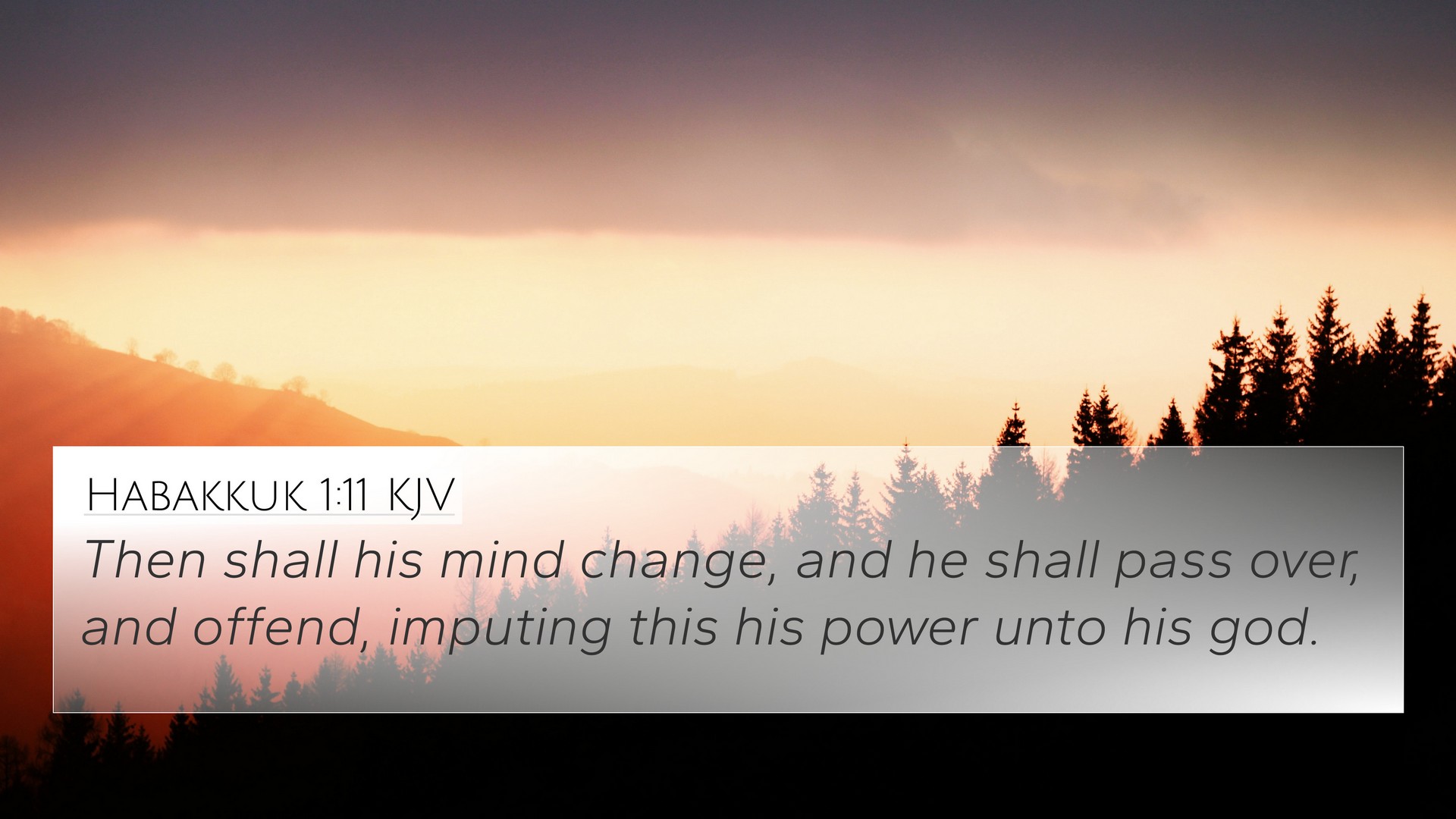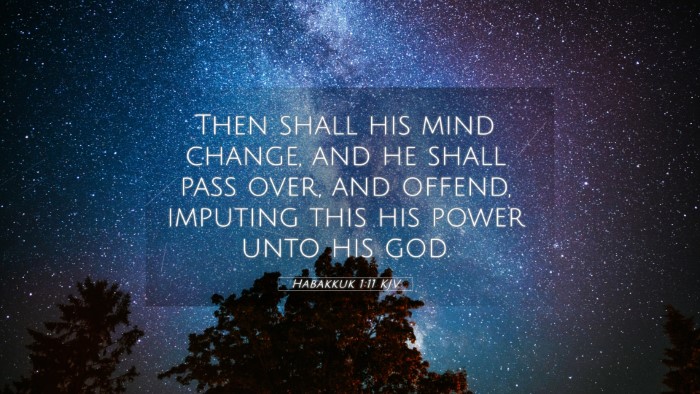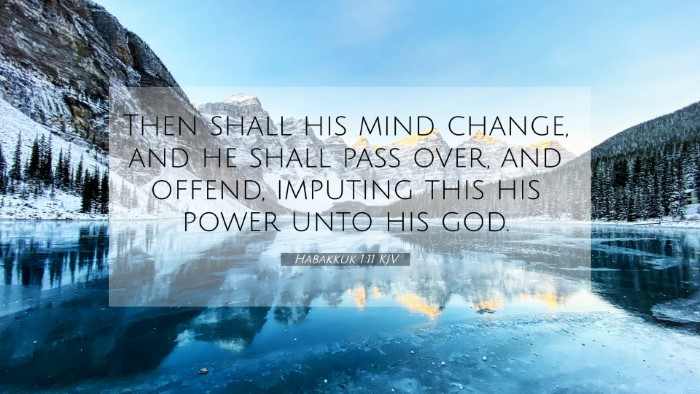Old Testament
Genesis Exodus Leviticus Numbers Deuteronomy Joshua Judges Ruth 1 Samuel 2 Samuel 1 Kings 2 Kings 1 Chronicles 2 Chronicles Ezra Nehemiah Esther Job Psalms Proverbs Ecclesiastes Song of Solomon Isaiah Jeremiah Lamentations Ezekiel Daniel Hosea Joel Amos Obadiah Jonah Micah Nahum Habakkuk Zephaniah Haggai Zechariah MalachiHabakkuk 1:11 Similar Verses
Habakkuk 1:11 Cross References
Then shall his mind change, and he shall pass over, and offend, imputing this his power unto his god.
Uncover the Rich Themes and Topics of This Bible Verse
Listed below are the Bible themes associated with Habakkuk 1:11. We invite you to explore each theme to gain deeper insights into the Scriptures.
Habakkuk 1:11 Cross Reference Verses
This section features a detailed cross-reference designed to enrich your understanding of the Scriptures. Below, you will find carefully selected verses that echo the themes and teachings related to Habakkuk 1:11 KJV. Click on any image to explore detailed analyses of related Bible verses and uncover deeper theological insights.
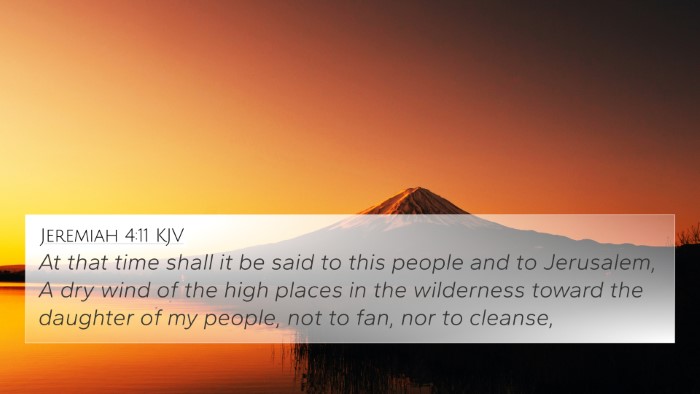
Jeremiah 4:11 (KJV) »
At that time shall it be said to this people and to Jerusalem, A dry wind of the high places in the wilderness toward the daughter of my people, not to fan, nor to cleanse,
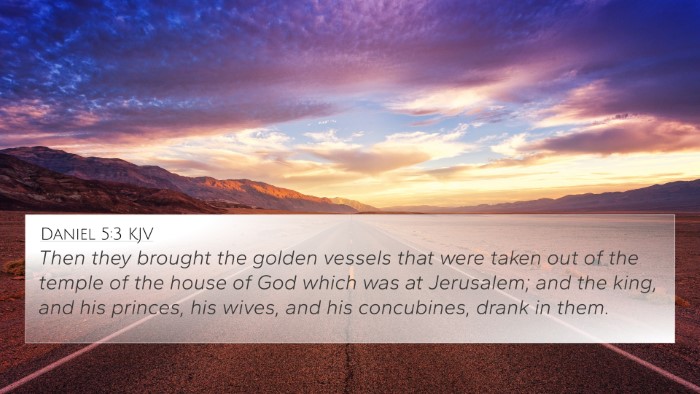
Daniel 5:3 (KJV) »
Then they brought the golden vessels that were taken out of the temple of the house of God which was at Jerusalem; and the king, and his princes, his wives, and his concubines, drank in them.

Daniel 4:30 (KJV) »
The king spake, and said, Is not this great Babylon, that I have built for the house of the kingdom by the might of my power, and for the honour of my majesty?

Daniel 5:20 (KJV) »
But when his heart was lifted up, and his mind hardened in pride, he was deposed from his kingly throne, and they took his glory from him:
Habakkuk 1:11 Verse Analysis and Similar Verses
Understanding Habakkuk 1:11
Bible Verse: Habakkuk 1:11 - "Then they sweep by like the wind and go on; guilty men, whose own might is their god!"
Summary of Meaning
The verse serves as a powerful commentary on the nature of the Chaldeans (Babylonians) who are characterized not only by their swift and devastating military tactics but also by their pride and idolatry. Habakkuk expresses his concern about the moral decay of those who hold power, depicting them as having their own strength as their deity, indicating a reliance on violence and military prowess instead of the true God.
Insights from Commentaries
Matthew Henry's Commentary
Matthew Henry emphasizes the arrogance and impiety of the Chaldeans, noting their rapid advance like the wind and their confidence rooted not in God but in their own strength. This commentary reflects on how such reliance represents a disconnect from divine sovereignty, showcasing how earthly powers can lead people astray.
Albert Barnes' Notes
Albert Barnes points out that the description of the Chaldeans as "guilty men" signifies their moral corruption. Their might is portrayed as a god, highlighting the theme of idolatry rooted in self-reliance. He draws a parallel to similar themes in other scriptures regarding God’s sovereignty over nations and the ultimate justice that will prevail.
Adam Clarke's Commentary
Adam Clarke interprets the verse through the lens of the consequences of idolatry, noting that the pride of the Chaldeans leads them to believe that their strength grants them impunity. He carefully describes how their downfall is inevitable due to their disdain for God's law and justice.
Cross References for Habakkuk 1:11
- Jeremiah 5:15 - "Lo, I will bring a nation upon you from far, O house of Israel,"
- Ezekiel 30:24 - "And I will strengthen the arms of the king of Babylon,"
- Isaiah 10:13-14 - "For he saith, By the strength of my hand I have done it,"
- Isaiah 47:10 - "Thou hast trusted in thy wickedness,"
- Psalm 33:16-17 - "There is no king saved by the multitude of an host,"
- Habakkuk 2:4 - "The just shall live by his faith,"
- Romans 1:17 - "For therein is the righteousness of God revealed from faith to faith,"
- 2 Timothy 3:1-5 - "This know also, that in the last days perilous times shall come,"
- Proverbs 16:18 - "Pride goeth before destruction, and a haughty spirit before a fall,"
- Revelation 19:11 - "And I saw heaven opened, and behold a white horse; and he that sat upon him was called Faithful and True,"
Connections and Thematic Bible Verse Insights
The theme of reliance on human strength versus divine power pervades many Biblical texts. Habakkuk 1:11 connects to the overarching Biblical narrative regarding the futility of idolatry and the promise of God’s justice.
Cross-referencing Biblical texts reveals key thematic connections:
- Spiritual Idolatry: How reliance on might as a ‘god’ parallels with teachings in Romans 1:23 regarding exchanging the glory of God for created things.
- Divine Justice: Links between this verse and Revelation 19:11 depict God's ultimate judgment against oppressive powers.
- The Danger of Pride: The warning against hubris is echoed in Proverbs 16:18, underscoring that pride precipitates downfall.
Conclusion
Habakkuk 1:11 serves as a poignant reminder of the dangers of self-reliance, pride, and idolatry. Through its insights, one can reflect on the important Biblical themes regarding the sovereignty of God, the nature of true strength, and the ultimate accountability of nations and rulers. By employing tools for Bible cross-referencing, the thematic connections across the scripture are revealed, leading to greater understanding and interpretation of God's word.
